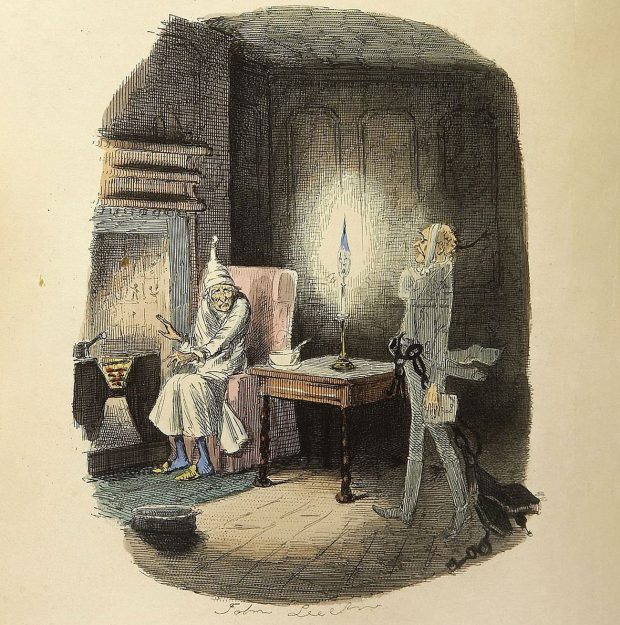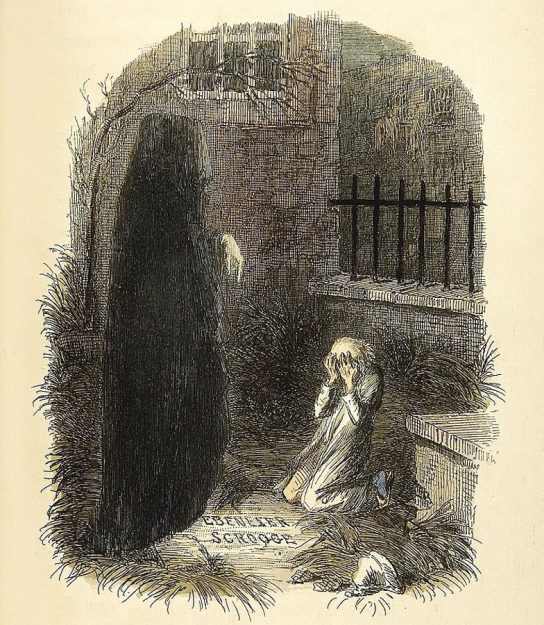The Dharma of Western Literature
In this series on The Dharma of Western Literature, we’ll consider six classic works through the lens of the six paramitas, or sublime virtues: generosity, ethical conduct, patience, diligence, meditation, and wisdom. First up is generosity, or dana.
***
Quick—what’s the most adapted work of literature in the English language? That’s right: Charles Dickens’s 1843 novella A Christmas Carol. By 1844, eight competing theatrical versions were playing in London, and soon Dickens himself was giving staged readings in England and the United States, complete with character voices. He continued until the year he died.
Since then, there have been literally hundreds of adaptations, including musicals, ballets, movies, TV shows, graphic novels, and video games. (Here’s a supercut of 400 of them, featuring, among others, Scooby-Doo, The Jetsons, My Little Pony, and Aqua Teen Hunger Force.) There have been book sequels and adaptations in the styles of Hemingway and Ayn Rand, and Christmas Carol–themed ads for Nyquil, La-Z-Boy Loungers, and Honey Nut Cheerios. The iconic miser Ebenezer Scrooge has been portrayed by such master thespians as Alastair Sim (in the peerless 1951 film version), Alec Guinness, Orson Welles, George C. Scott, and Michael Caine, as well as Oscar the Grouch, Mr. Magoo, Fred Flintstone, Super Mario, and, of course, Scrooge McDuck.
Why?
For starters, it’s an irresistibly great story. Its life-affirming message is deeply inspiring; reading it helped van Gogh overcome his suicidal impulses, at least for a while. But there must be something more than that. Any time a work has such enduring, universal appeal, we suspect that something in it speaks to our deep sense of what’s what—the same what’s what that we explore in the dharma.
Dickens’s tale offers profound insight into dana paramita, sublime generosity. Now, the word virtue can suggest an unpalatable duty that we take on in the hope of some future reward; we’re grudgingly good now to gain some kind of heaven later. But Buddhist psychology is shrewder than that. The paramitas are actually skillful meditative approaches to the business of daily living. They’re ways of realizing nirvana right here in samsara, of finding heaven in the very moment of our right behavior.
In the classical sequence, dana (pronounced DAH-na) is the first of the paramitas, a best first step on the path of awakening. Moment by moment, we’re given fresh opportunities to take and retake that step. Tipping your server? Maybe add another dollar to the tip. Feel a little freer, more expansive? Add another dollar. See how free you can afford to feel.
Scrooge, who overworks and underpays his clerk, Bob Cratchit, begrudging him even a few coals for the fire to keep off the winter cold, embodies the absence of dana paramita. Cratchit is the stand-in for all our fellow beings, whom we may choose to treat well or shabbily. Scrooge, of course, is us—the unenlightened us, in our futile attempts to achieve happiness through accumulation. Whether we accumulate money or fame or knowledge or cool toys or sexual conquests or TikTok views, the idea is that if we heap up enough, we’ll be happy at last. We’ll finally fill our jar with jelly beans, and then we’ll win. But sooner or later, gently or painfully, we learn that this doesn’t work; it’s an unskillful strategy. We may even (like Scrooge) forget that happiness was the original goal. All we’re left with is a calcified habit pattern, which, as if there’s no other choice, we cram ourselves into.
Thus, in pinching pennies, Scrooge has pinched himself. He has become “squeezing, wrenching, grasping, scraping, clutching, covetous, … secret, and self-contained, and solitary as an oyster. The cold within him froze his old features, nipped his pointed nose, shrivelled his cheek, stiffened his gait; made his eyes red, his thin lips blue. … He carried his own low temperature always about with him.” Virtue, as it turns out, really is its own reward, and vice is its own punishment. Miser is the root of the word miserable.
But even from the depths of his self-made misery, there are subtle signs that Scrooge seeks a way out, as all sentient beings do, consciously or not. When his nephew, Fred, wishes him a merry Christmas, he responds with an angry, dismissive “Bah! Humbug. … What reason have you to be merry? You’re poor enough.” Clearly, this is meant as a bitter rhetorical question. But from a place that’s deeper than his bitterness—a place Scrooge can’t consciously access yet—perhaps it comes as a sincere, even plaintive plea. What reason might we have to be merry, even if we’re poor? How might we be happy for no reason?
To access that place, if we’re as calcified as Scrooge, we may require the strong medicine of an encounter with mortality—a vision of death. That’s where the story begins. The first sentence is “Marley was dead.” Boom. It’s the ghost of Jacob Marley, Scrooge’s late business partner and fellow miser, who begins the intervention. He appears to Scrooge bound in a heavy chain made of “cash-boxes, keys, padlocks, ledgers, deeds, and heavy purses wrought in steel.” Marley explains: “I wear the chain I forged in life. … I made it link by link, and yard by yard; I girded it on of my own free will, and of my own free will I wore it.”

This is precisely how we become the victims of our own stinginess (or any other nonvirtue), bound and burdened by it. Every time we skimp on the server’s tip, or grab the big piece of cake before the next guy can get it, or are selfish with our time, our help, or our empathy, we become more tightly stuck in the notion that we’re a constricted separate self. The sense that we’re an isolated, finite little wave on the surface of the ocean of existence is reinforced by all our efforts to enlarge our wave by scooping up and hoarding every drop of water we can get, even at the expense of our fellow waves. Conversely, generosity helps free us to see that we were never just a wave. We’re the ocean.
The specter of Scrooge’s old partner appears on Christmas Eve with a warning not to end up like him. When, in keeping with Marley’s promise, the Ghosts of Christmas Past, Christmas Present, and Christmas Yet to Come visit Scrooge for his edification, they whisk him through time and space to give him a broader view of life and death, suffering and happiness, as lived by himself and a multitude of others—all in the context of Christmas, the one day dedicated to the spirit of selflessness, “the only time in the long calendar of the year, when men and women seem by one consent to open their shut-up hearts freely, and to think of people below them as if they really were fellow-passengers to the grave, and not another race of creatures bound on other journeys.” We’re on this one big bus with all our fellow beings. It would behoove us to acknowledge that always, but one day a year is a start.
Generosity helps free us to see that we were never just a wave. We’re the ocean.
Most of us remember most vividly the Ghost of Christmas Yet to Come: the mute, hooded, faceless figure that points with a bony finger to the grave. But the forms of the two prior Ghosts are also telling. The Ghost of Christmas Past is an anthropomorphized candle—“from the crown of its head there sprung a bright clear jet of light”—that whisks Scrooge through scenes of his childhood and youth, illuminating the painful estrangements and isolations that distorted his character into its present state. When traumatic material surfaces in meditation or therapy, we may try to suppress the dawning light, and so does Scrooge. The Ghost carries a cap under its arm, in the form of an extinguisher. “Scrooge … seized the extinguisher-cap, and by a sudden action pressed it down upon its head. The Spirit dropped beneath it, so that the extinguisher covered its whole form; but though Scrooge pressed it down with all his force, he could not hide the light: which streamed from under it, in an unbroken flood upon the ground.” Suppression doesn’t work. Sooner or later, we have to face the light … fortunately.

The Ghost of Christmas Present is another strange figure, a colossal monarch of abundance. “Heaped up on the floor, to form a kind of throne, were turkeys, geese, game, poultry, brawn, great joints of meat, sucking-pigs, long wreaths of sausages, mince-pies, plum-puddings, barrels of oysters, red-hot chestnuts, cherry-cheeked apples, juicy oranges, luscious pears, immense twelfth-cakes, and seething bowls of punch, that made the chamber dim with their delicious steam. In easy state upon this couch, there sat a jolly Giant, glorious to see.” As a sort of scepter of his power, the Giant holds a torch shaped like a horn of plenty, with which he sprinkles blessings on all those he and Scrooge encounter in their journeys through London and the wider world. When we clearly experience the actuality of the present (the only actuality there is), we discover that it’s rich, with a richness that’s the nature of existence itself, whether we live in a palace or a hut. Here Dickens is in accord with all the sages, who report that samsara is nirvana, that the kingdom of heaven is spread upon the earth if only people could see it. It’s all a big present, a generous gift. Our job is to enjoy it, to gracefully accept the present.
Then our natural response will be dana paramita. When life is experienced as overflowing, like a sprawling throne of mince-pies and plum puddings, it’s only natural to share the wealth. So nirvana inspires dana, even as dana supports nirvana. (All the paramitas work this way. Being good helps you see you’re in heaven; when you see you’re in heaven, naturally you’re good.) How to achieve this kind of seeing? To start, we can simply relax our unwinnable fight against actuality. When it rains, enjoy the rain, and leave off wishing for sunshine; when the neighbor’s dog barks through your meditation, leave off wishing for it to stop. Dickens understands this profound connection between the enjoyment of the present and the abandonment of hostilities: “Girded round [the Giant’s] middle was an antique scabbard; but no sword was in it, and the ancient sheath was eaten up with rust.”
When Scrooge awakens on Christmas morning from the vision of the three Ghosts, he is awake in the fullest sense. In the first moments of his expansive new vision, as commonly happens, he’s bliss-intoxicated:
“I don’t know what to do!” cried Scrooge, laughing and crying in the same breath … . “I am as light as a feather, I am as happy as an angel, I am as merry as a schoolboy. I am as giddy as a drunken man. A merry Christmas to everybody! A happy New Year to all the world. … I don’t know what day of the month it is! … I don’t know how long I’ve been among the Spirits. I don’t know anything. I’m quite a baby. Never mind. I don’t care. I’d rather be a baby. Hallo! Whoop! Hallo here!”
Clearly, this baby has been born again, fresh, his awareness radiantly empty. This is a declaration of beginner’s mind as Buddha-mind if ever there was one. At this point, most film Scrooges do a wild happy-dance. The best is Alastair Sim, who skips and leaps about in his nightshirt and, riffing on Dickens’s text, sings:
I don’t know anything!
I never did know anything!
But now I know that I don’t know
All on a Christmas morning!
Scrooge has the biggest turkey in the poulterer’s shop sent to the home of Bob Cratchit—anonymously, so that the pure happiness of dana paramita isn’t tainted by the selfish wish to receive credit. He gives Cratchit a big raise, he becomes “a second father” to Cratchit’s disabled son, Tiny Tim, and he’s transformed into the very embodiment of joyous generosity. Dickens’s summation of Scrooge’s metamorphosis suggests how an expansive spirit radiates outward from the light-filled individual to the farthest horizons. “He became as good a friend, as good a master, and as good a man, as the good old city knew, or any other good old city, town, or borough, in the good old world.”
Near the end, there’s a lovely vignette of Scrooge that may feel familiar to those who have tasted such awakening. The initial giddy, happy-dance bliss has now settled and mellowed, and Scrooge goes for a Christmas-morning walk through town. “The people were by this time pouring forth, … and walking with his hands behind him, Scrooge regarded every one with a delighted smile.” The position of his hands is a nice, subtle touch: a mudra of nongrasping, of pleasant, beneficent detachment. “He went to church, and walked about the streets, and watched the people hurrying to and fro, and patted children on the head, and questioned beggars, and looked down into the kitchens of houses, and up to the windows, and found that everything could yield him pleasure.”
The first beneficiary of our generosity, as of all the virtues, is ourselves. When we at last give up trying to hoard our way to happiness, we find that wherever we go, whatever we do, it yields us pleasure, even if we’re just walking down the street with our hands behind us. We’re happy for no reason. May that be your gift to yourself—and everyone’s gift to themselves—this holiday season.
“And so, as Tiny Tim observed, God bless Us, Every One!”
Thank you for subscribing to Tricycle! As a nonprofit, we depend on readers like you to keep Buddhist teachings and practices widely available.
